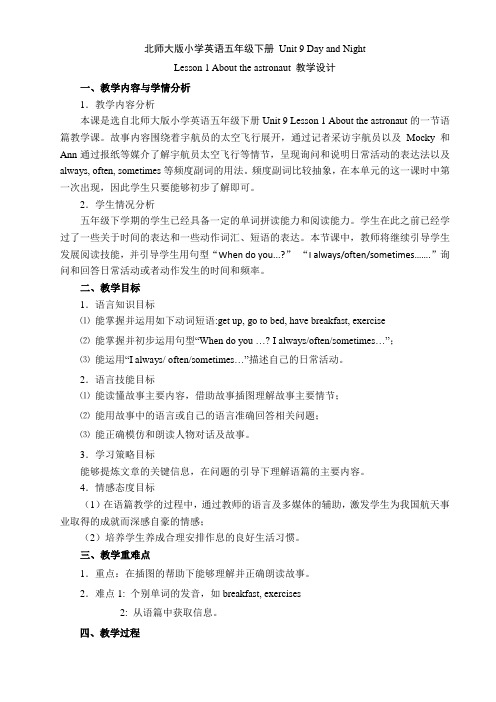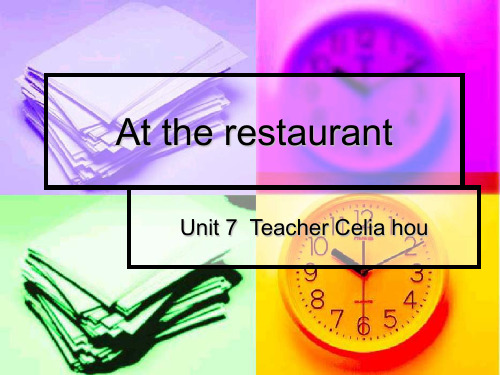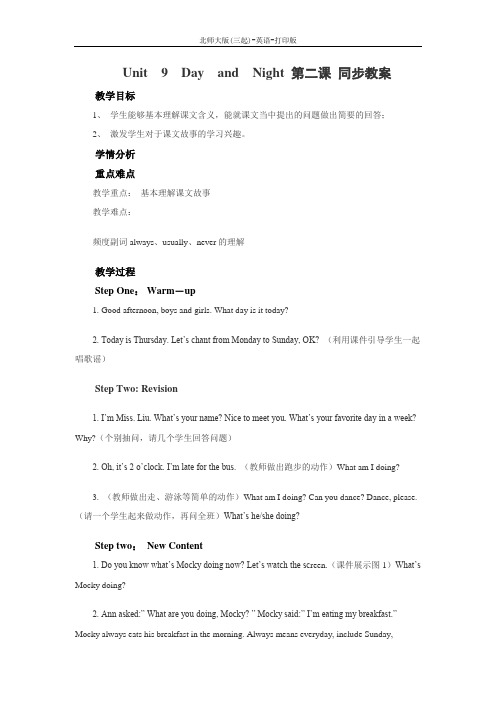(春)五年级英语下册 Unit 9《Day and night》教案 北师大版(三起)
高中英语北师大版高一下册《Unit9-PeriodⅢ》课件

• 【教师备课资源】 • pull at拉扯 • pull on/off穿着/脱(袜子,手套等) • pull over车(船)驶向一边 • pull together齐心协力
• 6.so far迄今为止 • I've designed five or six different cars so far.(教材P40) • 迄今为止我已经设计了五六款不同的汽车。 • So far no solid facts can support his theory. • 迄今为止还没有可靠的事实可以支持他的理论。 • We have learnt about 3,000 English words so far. • 迄今为止我们已经学习了大约3 000个英语单词。
- in; flight; gate; information desk; passenger; passport control ; platform; public transport; seat; ticket; ticket collector • 1.There are many words or phrases above about travel; can you choose some of them to tell us a story?
北师大版英语 高一 Unit9
Period Ⅲ
On the Move & Clean Machines
教学目标
• 1.熟记学案中所列出的词汇及用法。 • 2.通过学案中所给出的重点词汇和句式的学习,
让学生能够正确理解和使用这些词汇和句式,并 能够运用这些句式造句。
• 3.通过对语法的教学让学生能够理解并能够运用这些语法知识 ,能够熟练的掌握现在完成时和现在完成进行时的语法功能。
人教版小学六年级英语教案最新6篇

人教版小学六年级英语教案最新6篇小学六年级英语教案篇一一、教学内容1.词汇(略)。
2.句型:1)复习祈使句;2)This bag is too big/heavy/full.3.日常交际用语:继续学习有关请求及提供帮助的用语。
二、教具录音机等。
三、课堂教学设计1.复习前两课所学的词汇及句型。
教师可为学生设计几种情景,要求学生给出正确恰当的英语。
T:如果你看到别人需要帮助时,说什么?你需要帮助时,如何请求帮助?如何表示谢意等。
也可利用一些书包等实物,让同学到前面做类似上一课的小表演。
2.打开书,学生看图。
教师介绍本课词汇(利用图片或动作演示)。
3.放课文录音。
分段放,学生跟读两至三遍。
4.教师在前面布置几个小场景,分别请学生表演。
场景1) 请一位小个子同学搬动大纸箱,让一个大个子同学从他身边路过,引出以下对话:S1:This box is too heavy. I cant carry it. could you help me, please?S2:OK. Let me help you carry it.S1:Thanks.S2:Youre wele.场景2) 用一个书包,装满了书。
让一个小个子同学再拿一本书往里装,引出以下对话:S1:This bag is too full. I cant put the book into the bag.S2:OK, put the book over there.5.指导学生做练习册习题。
6.布置作业1)抄写生词、练习朗读本课对话;2)完成练习册习题。
四、交际用语The box is too heavy. 这个箱子太重了。
句中too是副词,表示:太……,通常放在形容词前。
例如:The sweater is too small. 这件毛衣太小了。
需要注意的是,too还表示也的意思,经常放在句末,应该加以区别。
例如:A:How are you? 你好吗?B:Fine, thank you. And you? 很好,谢谢。
五年级下册英语教案 Unit9 Day and night Lesson1 北师大版(三起)

北师大版小学英语五年级下册Unit 9 Day and NightLesson 1 About the astronaut 教学设计一、教学内容与学情分析1.教学内容分析本课是选自北师大版小学英语五年级下册Unit 9 Lesson 1 About the astronaut的一节语篇教学课。
故事内容围绕着宇航员的太空飞行展开,通过记者采访宇航员以及Mocky 和Ann通过报纸等媒介了解宇航员太空飞行等情节,呈现询问和说明日常活动的表达法以及always, often, sometimes等频度副词的用法。
频度副词比较抽象,在本单元的这一课时中第一次出现,因此学生只要能够初步了解即可。
2.学生情况分析五年级下学期的学生已经具备一定的单词拼读能力和阅读能力。
学生在此之前已经学过了一些关于时间的表达和一些动作词汇、短语的表达。
本节课中,教师将继续引导学生发展阅读技能,并引导学生用句型“When do you...?”“I always/often/sometimes…….”询问和回答日常活动或者动作发生的时间和频率。
二、教学目标1.语言知识目标⑴能掌握并运用如下动词短语:get up, go to bed, have breakfast, exercise⑵能掌握并初步运用句型“Whe n do you …? I always/often/sometimes…”;⑶能运用“I always/ often/sometimes…”描述自己的日常活动。
2.语言技能目标⑴能读懂故事主要内容,借助故事插图理解故事主要情节;⑵能用故事中的语言或自己的语言准确回答相关问题;⑶能正确模仿和朗读人物对话及故事。
3.学习策略目标能够提炼文章的关键信息,在问题的引导下理解语篇的主要内容。
4.情感态度目标(1)在语篇教学的过程中,通过教师的语言及多媒体的辅助,激发学生为我国航天事业取得的成就而深感自豪的情感;(2)培养学生养成合理安排作息的良好生活习惯。
Unit9Dayandnight(教学设计)北师大版(一起)英语四年级下册

Unit 9 Day and night 教学设计教学目标1、学生能够掌握字母or和oor在单词中的发音,并能完成练习;2、能熟练掌握小黑板关于使用频率词汇的句型,并能运用always、usually、often、sometimes、never回答有关于日常生活规律的问题;3、能运用频率词汇说一说自己的日常生活。
学情分析本节课的教学对象是我校四年级的学生,学生整体情况如下:1、大多数学生对英语学习有浓厚的兴趣,喜欢听英语、说英语,乐于用英语交流,思维活跃,善于模仿;2、学生经过将近四年的英语学习,已经能够感知单词的发音规律并能在一定的引导下总结发音规律;3、经过前三个课时的学习,学生已经能够初步掌握表示频率的词汇的用法,并能尝试初步运用;4、仍有少数学生对用英语进行表达感觉吃力,有畏难情绪;or和oor的发音对于学困生来说不易掌握。
重点难点1、学生能够掌握字母or和oor在单词中的发音;2、能运用always、usually、often、sometimes、neve说一说自己的日常生活。
教学过程【导入】Warm-upSing a song~BINGOIntroduce Little Jack.T:Just now we sang a song about a farmer.Look,this is Little Jack.He is a farmer,too.Let’s say Hello to him.【讲授】Presentation1.Visit Little Jack’s house结合图片首次感知语音词汇;T:Oh,this is Jack’s house. There are many things on the floor.What are they?2.Help Little JackT:It’s not clean.Let’s clean them up.Where can we put them?3.Chant1)Listen to the ChantT:Oh,now his room is very clean so he is very happy.Listen!He is chanting for you.2)Look and say(Show the chant.)3)Practice in groups4)Show the chant5)Chant with Little JackT:Who wants to chant with Little Jack?You can stand up.4.Present the words(以文字的形式呈现语音词汇)【练习】Practice OneI.Learning1、Try to readT:Good!You did very well.Can you read these words?2、Listen and readT:Now let’s read follow the computer and pay attention to these red letters.3、Try to find the rulesT:Great!What do you find?(引导学生说出字母o和or/oor的发音规律)II. Rules4、Say out the wordsT:Can you try to read these words?板书:o or/oorg o t l or dd o t m or e... ...5、Say more words like theseT:Can you say any words like these?III. Practicing6、Task One~Cross the riverT:Good!Oh,you know so many words now.Can you help Jack?He wants to cross the river.But some parts of the woods are broken.Can you find and cross them?Now do it in groups.7、Task Two~Pick up some mushroomsT:Now Jack can cross the river.Can you guess what will he do?T:Oh,he wants to pick some mushrooms.And look there are many mushrooms and there are two baskets.Can you put them into the right basket?Do it in groups.T:Which group wants to show your baskets?【练习】Practice TwoI. Let's learn1.Play a Game~Words poolT:Little Jack is very happy.It’s dinner time.He wants to wash the mushrooms in the water.Look!Here’s the pool.Oh,it’s a words you want to play a game?T:I will point some words and these words can make a sentence.When I stop,you should say out the sentence as quickly as you can.(教师指出句子)2.Read Uncle Booky’s BlackboardT:Oh,there are many sentences in this pool but wait a minute let’s read them first.3.Read Uncle Booky’s Blackboard.4.Play the Game.(学生指句子)T:Now,it’s your turn.Who wants to point a sentence for us?II. Let's say1.GuessingT:Oh,Little Jack not only picks the mushrooms every day.He also has many things to do.Can yo u guess what things he does every day?2.Ask and answera.T:Let’s see what things he does every day.(呈现图片)b.T:Do you want to know when he does these things?Let’s ask him.板书:When do you...?Let’s listen.板书:I always...3.Order the words.【活动】Extension1.Touch and SayT:Now we know when Little Jack does these things.Do you remember our friend Ken?(出示PPT)a.Guessing what are they talking aboutT:Oh,he is talking with his friend.What are they talking?S:They are talking about the time.T:Yes,let’s read it together.b.Ask and answer in pairsT:Please open your books.Turn to Page33.Look at these pictures.And try to ask and answer in i s Ken and another one is his friend.T:When does Ken...?板书:When does...?He usually...c.Show the dialogue.2.Read about Ken’s daily lifeT:Oh!This is Ken’s daily life.Read it in your groups.3.Say something about your life.T:Listen!What did he say?(播放Ken的录音)T:Can you talk with your partner?And you can use these phrases or what other things you want to say.【作业】Homework1)Practice the pronunciation;2)Try to write about your daily life。
【北师大版】小学英语3-6年级(三年级起点)教材目录

【北师大版】小学英语3-6年级(三年级起点)教材目录北师大版《小学英语》教材以美国本土教材为蓝本,在保留了原教材特点的基础上,针对中国英语教学需求和我国学生的学习特点加以适当修改。
编写特色继承了原版教材的编写风格,以童话故事的形式设计课文内容,以拟人化的小动物和小学生作为主人公,课文语言生动、地道、真实、自然。
三年级(上册)Unit 1 HelloUnit 2 FriendsUnit 3 Playing TogetherUnit 4 My FamilyUnit 5 My ThingsUnit 6 ReviewProgress CheckUncle Booky’s ABCVocabularyWord ListMasks三年级(下册)Unit 7 FruitsUnit 8 VegetablesUnit 9 NumbersUnit 10 ColorsUnit 11 I CanUnit 12 ReviewProgress CheckUncle Booky’s ABC VocabularyWord List四年级(上册)Unit 1 SignsUnit 2 ShoppingUnit 3 Uncle Booky’s Study Unit 4 Bobby’s HouseUnit 5 At SchoolUnit 6 ReviewProgress CheckVocabularyWord List四年级(下册)Unit 7 At the Restaurant Unit 8 Talent ShowUnit 9 Hot SoupUnit 10 Mocky’s Store Unit 11 IllnessUnit 12 ReviewProgress Check VocabularyWord List五年级(上册)Unit 1 JobsUnit 2 AnimalsUnit 3 ClothesUnit 4 PositionUnit 5 PlacesUnit 6 ReviewProgress Check VocabularyWord List五年级(下册)Unit 7 Days of the Week Unit 8 TimeUnit 9 Day and Night Unit 10 ActivitiesUnit 11 WeatherUnit 12 ReviewProgress Check VocabularyWord List六年级(上册)Unit 1 SpaceUnit 2 An AccidentUnit 3 SportsUnit 4 BirthdayUnit 5 Height and Weight Unit 6 ReviewProgress Check VocabularyWord List六年级(下册)Unit 7 VacationUnit 8 MusicUnit 9 The Year 2050 Unit 10 Review 1Unit 11 Review 2Unit 12 Review 3 VocabularyWord ListVerb Forms。
北师大版小学英语四年级下册全册精品课件

What time is it?
What time is it? It’s one o’clock. 一点了
What time is it?
It’s two o’clock. 两点了。
What time is it?
It’s five o’clock. 五点了。
(北师大版)四年级英语下册课件
day
night
breakfast
[e]
[ə]
lunch
[۸]
dinner
dinner
morning afternoon
evening at night
go to bed
[əu] [u:] [ e]
sleep get up
[i:]
[e] [۸]
英国人一日三餐:
星期日
4
SUNDAY
Days of the week
Sunday is the first day of the week. Monday is the second. Tuesday is the third. Wednesday is the fourth. Thursday is the fifth. Friday is the sixth. Saturday is the seventh.
Sunday.
1 . What day is it today? Today is Monday.
2. What day is it tomorrow? Tomorrow is Tuesday.
NOVEMBER 十一月
星期二
6
TUESDAY
NOVEMBER 十一月
星期一
5
北师大版-英语-五年级下册-Unit 9 Day and Night第二课 同步教案

Unit9Day and Night 第二课同步教案教学目标1、学生能够基本理解课文含义,能就课文当中提出的问题做出简要的回答;2、激发学生对于课文故事的学习兴趣。
学情分析重点难点教学重点:基本理解课文故事教学难点:频度副词always、usually、never的理解教学过程Step One: Warm-up1. Good afternoon, boys and girls. What day is it today?2. Today is Thursday. Let’s chant from Monday to Sunday, OK? (利用课件引导学生一起唱歌谣)Step Two: Revision1. I’m Miss. Liu. What’s your name? Nice to meet you. What’s your favorite day in a week? Why?(个别抽问,请几个学生回答问题)2. Oh, it’s 2 o’clock. I’m late for the bus. (教师做出跑步的动作)What am I doing?3. (教师做出走、游泳等简单的动作)What am I doing? Can you dance? Dance, please. (请一个学生起来做动作,再问全班)What’s he/she doing?Step two:New Content1. Do you know what’s Mocky doing now? Let’s watch the sc reen.(课件展示图1)What’s Mocky doing?2. Ann asked:” What are you doing, Mocky? ” Mocky said:” I’m eating my breakfast.” Mocky always eats his breakfast in the morning. Always means everyday, include Sunday,Monday, Tuesday, Wednesday, Thursday, Friday, Saturday and all the holidays. Read after me, always, use your fingers, a-l-w-a-y-s, always. Read after me, I always eat breakfast in the morning.3. (课件展示图2)Now, Mocky wants to know what time does Ann eat her breakfast. So he asked:” When do you eat breakfast, Ann?” Ann answered:”breakfast in the morning, too.” When equals to what time. (板书提示)4. When do you eat breakfast? OK, please ask your partner when does he or she eat breakfast? Practice in pairs. (引导学生两人小组进行对话练习)Who want to have a try? Hands up. (请几个学生回答问题)5. Do you always eat breakfast in the morning? On Saturdays, I don’t eat breakfast in the morning. I sleep in the morning on holidays. So I could only say: I usually eat breakfast in the morning. Usually means not always.6. (课件展示图6)Ann and Mocky go to visit Uncle Booky. Ann wanted to know what does Uncle Booky do in the morning. Do you want to know? How does Mocky answer her? Watch the screen. Let’s read the sentence together. He usually reads a book. What do you do in the morning?(询问几个学生)Now you can ask your partner what does he or she do in the morning or afternoon, practice in pairs.(引导学生进行两人练习,并请两组学生起来展示对话)7. Ken, Ann and Mocky go to visit Uncle Booky. Now, they are at Uncle Booky’s house. But where is Uncle Booky?8. (课件展示图9)Do they find Uncle Booky? Where is he? Does Mocky know? No, he doesn’t know. He says:” I don’t know. He’s usually at home in the morning.”9. (课件展示图10)Uncle Booky is usually at home in the morning, when does he go to the store? Ken wants to know, so he asks. Mocky answered:” He o ften goes to the store in the afternoon. He never goes in the morning.” Often and usually are almost the same meaning.(手势讲解差不多相同)Never means no, not.(加上表情、手势强调never,贴片讲解)Let’s read the two sentences together. He often goes to the store in the afternoon. He never goes in the morning.10. Where is Uncle Booky? What’s he doing now? Can you guess?(请两三个学生起来猜Uncle Booky到底在做什么)Look, he’s sleeping. He sometimes sleeps in the morning! Uncle Booky usually reads a book in the morning, but that day, he sleeps. So he sometimes sleeps in the morning.Step three: Practice1. Do you like the story? I like it because it’s funny. Let’s watch it from the very beginning. After you watch the whole story, please answer my questions.(课件从头播放故事动画)2. Here are the questions for you.(课件展示提问的几个问题)You can talk with your partner, and then give me your answer.(引导学生小组之内根据课文内容讨论问题,然后进行问题的回答)3. After class, please read the story after the tape. Next time, please tell the story to us, OK? That’s all for today. Goodbye, boys and girls!。
五年级下英语教案Unit9Dayandnight_北师大版(三起)

Unit 9 Day and night(第一课时)教学目标:(1)通过学习,能够用英语简单描述自己一天的活动。
(2)对学生进行养成安排良好作息时间的教育。
(3)培养学生的综合素质及英语能力。
教学重点:1.掌握下列这些句型:When do you always/usually/often/sometimes/never/ eat breakfast?I __________ eat breakfast__________.2.When does he always/usually/often/sometimes/ do in the morning?He_______ goes to the store___________.教学难点: 能在相关的语境中正确运用所学句型。
教具准备: 教学卡片、多煤体等。
教学过程:一、导入师:What time do you go to school ?生:I go to school_____________.二、学习生词always、 usually、 often、 sometimes、 never。
1).学习生词 always师:What time do you get up ?生:I get up at ______________.师:Yes, I always get up at six .师再问:When do you get up ? (When means what time)师出示when生词卡片,学习生词when。
师再问另外几个同学此句型,师还用 I always ______________.句型回答。
师出示always 生词卡片,学习生词always。
2). 用同样方法的学习 usually、 often。
3). 学习生词 sometimes 师: When do you go to bed every day ?生: I go to bed at __________.师: Oh , you go to bed too late. So you sometimes go to school late . 师出示sometimes生词卡片,学习生词sometimes.4). 学习生词 never.师: When do you go to bed every day ?生: I go to bed at __________.5)师: Oh , you go to bed too early. So you never go to school late .师出示never 生词卡片,学习生词never.5). 跟录音认读生词always、 usually、 often、 sometimes、 never。
- 1、下载文档前请自行甄别文档内容的完整性,平台不提供额外的编辑、内容补充、找答案等附加服务。
- 2、"仅部分预览"的文档,不可在线预览部分如存在完整性等问题,可反馈申请退款(可完整预览的文档不适用该条件!)。
- 3、如文档侵犯您的权益,请联系客服反馈,我们会尽快为您处理(人工客服工作时间:9:00-18:30)。
Unit 9 Day and night单元教材分析本单元是北师大版小学英语四年级下学期的第九单元,是在七、八单元学习了星期和钟点的表达法的基础之上的进一步延续。
主要涉及的知识点是一天中morning,afternoon,evening,night的表达法和breakfast, lunch, dinner,频度副词always,usually,often,sometimes,never以及日常生活中一些行为动词及短语get up, go to bed, eat,sle ep等。
根据词不离句的教学理念,我将本课单词的教学放在 When do you…? I always/ usually…at…in the morning/ afternoon.的句型中进行巩固和运用。
单元教学目标教学目标:1、知识目标(1)能听懂、会说以下单词:breakfast, lunch, dinner, morning, afternoon,sleep , when,等表示日常活动或行为的单词,及认读always, usually, often, sometimes, never等频度的单词,能在交流中运用。
(2)能听懂、运用以下日常交际用语:句型When do you…? I always/usually…at…in the…. 。
2、能力目标:能用所学的知识简单的表述自己想询问别人时间的安排。
能运用句型When do you…? I always/usually…at…in the…. 。
3、情感目标:(1)增强学生运用所学英语进行交际的意识和勇气。
(2)通过鼓励学生在真实的语言情景中学会养成生活有规律的意识和习惯。
教学重点1.本课表示三餐的词语breakfast, lunch, dinner,动词及短语get up, go to bed, eat, sleep,频率副词always,usually,often,sometimes,never2.句型When do you…? I always/usually…at…in the…. 。
教学难点1. Morning, afternoon, evening与night所用介词的区别。
2. 句型I always/usually…at…in the….Unit 9 Day and night (第一课时)教学目标:知识目标:1、学习新单词:breakfast, lunch, dinner, morning, afternoon,sleep , when,等表示日常活动或行为的单词,及认读always, usuall y, often, sometimes, never等频度的单词,能在交流中运用。
2、学习句型:When do you (get up)? I (always) get up at (seven o’clock).能够在交流加以运用。
3、学习故事,初步感知句型,理解内容。
能力目标:1、能初步认读运用单词及句型2、能够理解故事内容,并朗读课文故事情感目标:通过课文故事的学习,培养、提升学生养成生活有规律的意识和习惯。
教学重点:能够运用句型:When do you (…)?来询问别人时间的安排,并运用I(always)(…)at (...o’clock).来描述自己做某事的时间和频率。
教学难点:单词发音:always、usually、breakfast及描述的句型。
教学目标:知识目标:1、学习新单词:breakfast, lunch, dinner,2、能够理解故事内容,并朗读课文故事morning, afternoon, sleep , when,等表示日常活动或行为的单词,及认读always, usually, often, sometimes, never等频度的单词,能在交流中运用2、学习句型:When do you (get up)? I (always) get up at (seven o’clock).能够在交流加以运用。
3、学习故事,初步感知句型,理解内容。
能力目标:1、能初步认读运用单词及句型情感目标:通过课文故事的学习,培养、提升学生养成生活有规律的意识和习惯。
教学重点:能够运用句型:When do you (…)?来询问别人时间的安排,并运用I(always)(…) at (..o’clock).来描述自己做某事的时间和频率。
教学难点:单词发音:always、usually、breakfast及描述的句型。
教具准备:卡片、光盘、录音机教学过程:一、复习导入:1、游戏,猜一猜:师做睡觉的动作,然后提问,What am I doing?2、指生做动作,生猜,复习以前学过的表动作的核心词汇(playing、reading、 cooking、drinking、eating、Washington、painting)3、导入:今天我们要学习一些新的词汇和短语,请大家接着猜二、词汇学习:1、师做起床的动作,生猜,然后出示卡片起床图,引出短语并板书:get up,示意学生根据经验读e的发音,然后师领读,分组说中英文2、其他短语同上 eat breakfast 、go to bed分解,想前半部分和哪个词比较接近,板书bread,告诉学生记忆单词的方法:用学过的单词来认读新单词,然后分解读新单词,再连读,分组练习读。
3、利用卡片学习moring、afternoon、night、lunch、dinner4、学习频度副词:(1)师指着eat breakfast,陈述:I always eat breakfas in the morning。
生猜测句意。
然后板书频度副词:always 解释词义,然后读(2)提问:放学之后你通常和朋友一起玩吗?(3)其他词同上方法(4)板书,让生说一说其频率,然后按顺序读一读四、句型学习:(1)师继续指着eat breakfast,陈述:I always eat breakfas at seven in the morning。
When do you eat breakfast?生猜测句意(2) 操练:师生、生生When do you 。
?I 。
五、学习课文(一)看故事,了解故事的主要内容。
1、生自己结合插图及句子看故事,画出不懂的词句子,然后和同学说一说2、师点击光盘结合图提问,理解故事:What is Mocky doing ?Does he eat breakfast so late ?When does Ann eat breakfast ? Where are they going ?或:What are they going to do ?(二)听故事:1、完整听一听,听后提问:What does Uncle Booky do in the morning ?Is Uncle Booky at home ?2、生回答,然后在书上找到相应的句子读一读。
(三)读故事1、跟光盘逐句读一遍。
2、自己读,划下不会读的地方。
3、重点指导读1、2、4、8副图,随录音读,然后师领读。
六、小结:今天我们又学习了询问别人什么时间做某事的新的问法,,我们一起来读一读。
看黑板读重点句型。
七、作业:听课文录音,朗读课文。
Unit 9 Day and night (第二课时)教学目标:1、学生能够基本理解课文含义,能就课文当中提出的问题做出简要的回答;2、激发学生对于课文故事的学习兴趣。
教学重点:基本理解课文故事教学难点:频度副词always、usually、never的理解教具准备:课件,句型贴片,评比用具教学过程:Step One: Warm-up1. Good afternoon, boys and girls. What day is it today?2. T oday is Thursday. Let’s chant from Monday to Sunday, OK? (利用课件引导学生一起唱歌谣)Step Two: Revision1. I’m Miss. Liu. What’s your name? Nice to meet you. What’s your favorite day in a week? Why?(个别抽问,请几个学生回答问题)2. Oh, it’s 2 o’clock. I’m late for the bus. (教师做出跑步的动作)What amI doing?3. (教师做出走、游泳等简单的动作)What am I doing? Can you dance? Dance, please. (请一个学生起来做动作,再问全班)What’s he/she doing?Step Three: New Content1. Do you know what’s Mocky doing now? Let’s watch the screen.(课件展示图1)What’s Mocky doing?2. Ann asked:” What are you doing, Mocky? ” Mocky said:” I’m eating my breakfast.” Mocky always eats his breakfast in the morning. Always means everyday, include Sunday, Monday, Tuesday, Wednesday, Thursday, Friday, Saturday and all the holidays. Read after me, always, use your fingers, a-l-w-a-y-s, always. Read after me, I always eat breakfast in the morning.3. (课件展示图2)Now, Mocky wants to know what time does Ann eat her breakfast. So he asked:” When do you eat breakfast, Ann?” Ann answered:” I eat breakfast in the morning, too.” When equals to what time. (板书提示)4. When do you eat breakfast? OK, please ask your partner when does he or she eat breakfast? Practice in pairs. (引导学生两人小组进行对话练习)Who want to havea try? Hands up. (请几个学生回答问题)5. Do you always eat breakfast in the morning? On Saturdays, I don’t eat breakfast in the morning. I sleep in the morning on holidays. So I could only say: I usually eat breakfast in the morning. Usually means not always.6. (课件展示图6)Ann and Mocky go to visit Uncle Booky. Ann wanted to know what does Uncle Booky do in the morning. Do you want to know? How does Mocky answer her? Watch the screen. Let’s read the sentence together. He usually reads a book. What do you do in the morning?(询问几个学生)Now you can ask your partner what does he or she do in the morning or afternoon, practice in pairs.(引导学生进行两人练习,并请两组学生起来展示对话)7. Ken, Ann and Mocky go to visit Uncle Booky. Now, they are at Uncle Booky’s house. But where is Uncle Booky?8. (课件展示图9)Do they find Uncle Booky? Where is he? Does Mocky know? No, he doesn’t know. He says:” I don’t know. He’s usually at home in the morning.”9. (课件展示图10)Uncle Booky is usually at home in the morning, when does he go to the store? Ken wants to know, so he asks. Mocky answered:” He often goes to the store in the afternoon. He never goes in the morning.” Often and usually are almost the same meaning.(手势讲解差不多相同)Never means no, not.(加上表情、手势强调never,贴片讲解)Let’s read the two sentences together. He often goes to the store in the afternoon. He never goes in the morning.10. Where is Uncle Booky? What’s he doing now? Can you guess?(请两三个学生起来猜Uncle Booky到底在做什么)Look, he’s sleeping. He sometimes sleeps in the morning! Uncle Booky usually reads a book i n the morning, but that day, he sleeps. So he sometimes sleeps in the morning.Step Four: Practice1. Do you like the story? I like it because it’s funny. Let’s watch it from the very beginning. After you watch the whole story, please answer my questions.(课件从头播放故事动画)2. Here are the questions for you.(课件展示提问的几个问题)You can talk with your partner, and then give me your answer.(引导学生小组之内根据课文内容讨论问题,然后进行问题的回答)3. After class, please read the story after the tape. Next time, please tell the story to us, OK? That’s all for today. Goodbye, boys and girls!Unit 9 Day and night (第三课时)教学目标:1.进一步巩固用英语简单描述自己一天的活动。
